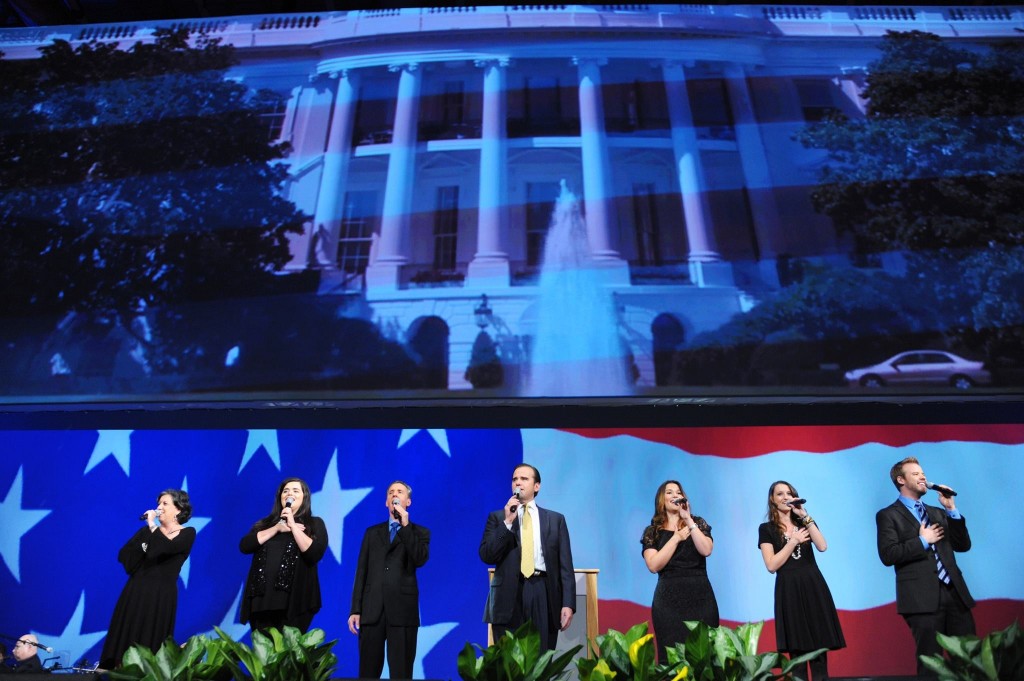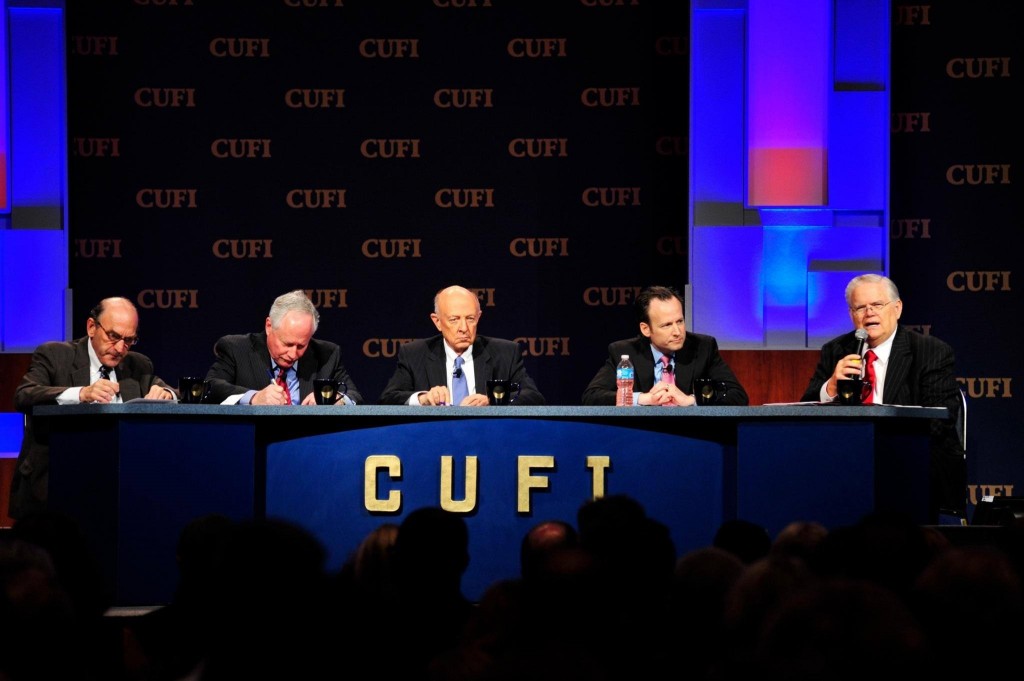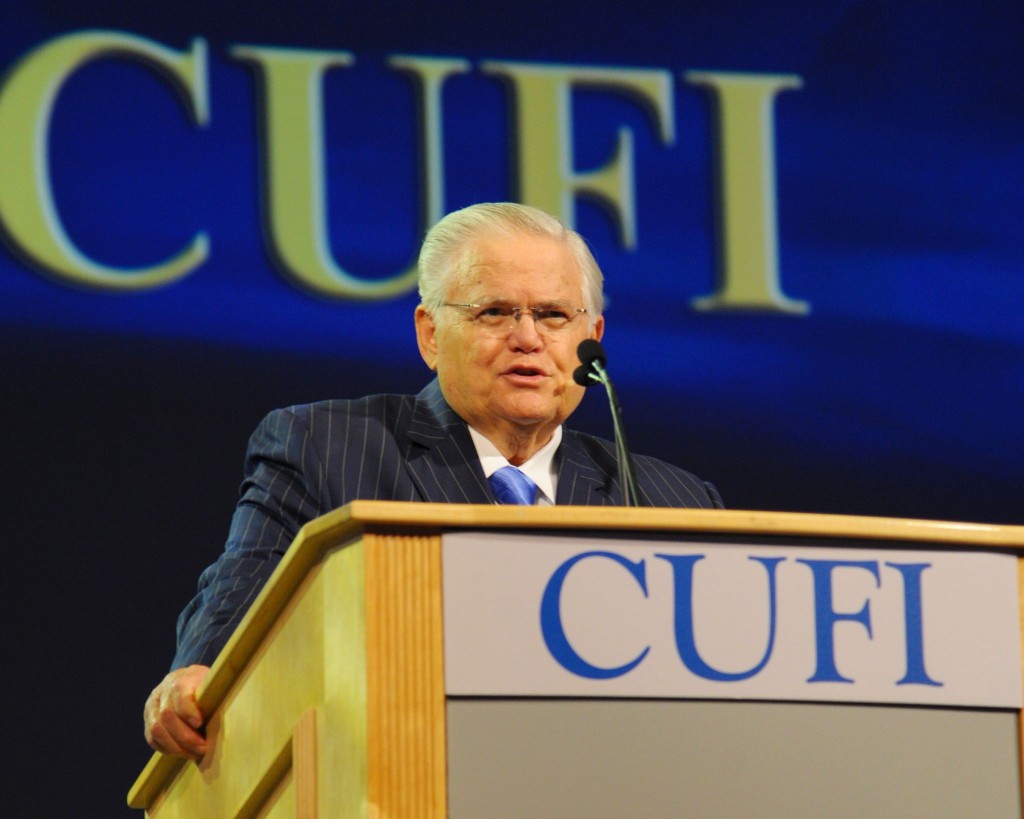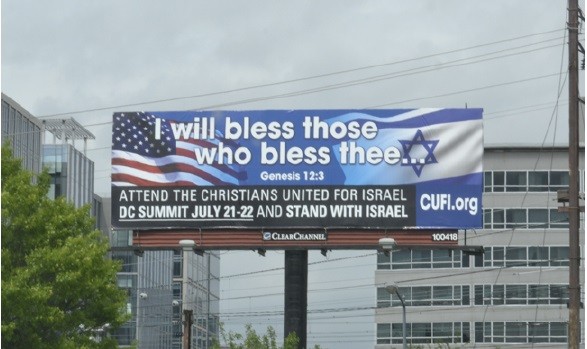As the attacks on Israel turn wild and violent around the world, perhaps it is time for those who do support Israel–Jews and Christians–to join forces?
On June 23, 2014, two days after the Presbyterian Church USA (PCUSA) voted 310 to 304 to divest from companies doing business with Israel, the organization Christians United for Israel (CUFI) issued an “action alert” to its 1.75 million members. The alert condemned the action and said, “Happily, this small and shrinking denomination does not speak for America’s Christians.”
Within 24 hours, 26,000 CUFI members emailed Israeli Prime Minister Benjamin Netanyahu, saying, “As an American Christian, I want you to know that the PCUSA does not speak for me.”
PCUSA’s membership has been declining for more than a decade, while CUFI’s has grown exponentially. Pastor John Hagee, head of the non-denominational, 20,000-member Cornerstone Church in San Antonio, founded CUFI in 2006. Two years later, it had grown to 100,000 members, reaching one million in 2012, 1.5 million in 2013, and now has 1.75 million today. Its membership currently exceeds the total number of all Presbyterians in the United States.
CUFI is now the largest pro-Israel organization in the world in terms of membership, and one of the most active Christian organizations in America. It has held more than 1,700 pro-Israel events, including 260 formal “Nights to Honor Israel.” It hosts an average of 40 pro-Israel events a month; holds regular conference calls with Israeli and American officials and pastors; has a growing campus organization at more than 300 colleges; publishes a quarterly magazine; and has a Facebook page with 1.2 million “likes,” more than 10 times that of AIPAC and J Street combined.

The CUFI Singers leading the national anthems of the United States of America and Israel at Night to Honor Israel event at the 2014 CUFI Washington Summit. Photo: CUFI / Facebook
Behind these numbers is a story about Christian Zionism that many Americans do not fully appreciate or understand. Since most evangelical Christians are conservatives, and most American Jews are liberals, the evangelical-Jewish alliance will always be “at least partially a matter of strange bedfellows,” in the words of cultural historian Wilfred M. McClay. McClay argues, however, that when it comes to Israel, there is “a deep commonality” and mutual concern that goes to the heart of each group’s religious beliefs, even if those beliefs fundamentally differ in other respects.
The 2014 CUFI Washington Summit demonstrated that both communities can engage in an important common cause together, without either group sacrificing its other beliefs.
The Summit is CUFI’s biggest annual event, and the one held on July 21-22, 2014 was its largest yet. Almost 5,000 delegates from all 50 states attended. The speakers were as high-profile as they come, including Israeli Prime Minister Netanyahu (via video link-up); Israeli Ambassador to the U.S. Ron Dermer; U.S. Senators Bob Corker, John Cornyn, Ted Cruz, Lindsey Graham, and Tim Scott; Rep. Michele Bachmann; Malcolm Hoenlein, executive vice chairman of the Conference of Presidents of Major American Jewish Organizations; former CIA Director James Woolsey; former deputy national security adviser Elliott Abrams; columnists Charles Krauthammer, William Kristol, and Dennis Prager; and Dror Eydar of Yisrael Hayom (Israel’s largest newspaper), among others.
The agenda was packed. After a day of panel discussions, the delegates attended a “Night to Honor Israel” dinner that lasted until 10 p.m. They returned to the Washington Convention Center the next day at 8 a.m. to hear presentations from the senators and Rep. Bachmann, and devoted the rest of the day to lobbying Congress. The Summit concluded with a dinner for 1,000 of CUFI’s major donors, including an address by Dennis Prager.
CUFI is run by a national staff of just 25 people—comprised of both Christians and Jews. The executive director is David Brog, who is Jewish and the author of In Defense of Faith: The Judeo-Christian Idea and the Struggle for Humanity (2010) and Standing With Israel: Why Christians Support the Jewish State (2006). The CUFI communications director, Ari Morgenstern, is also Jewish.
The staff prepared talking points for the delegates, with background information and the positions of each member of Congress on Israel-related issues. The principal point was that Iran must be “denied not only a nuclear weapon, but also a nuclear weapons capability,” because “allowing Iran to develop all of the components of a bomb so long as they don’t put these components together is not a solution.”

Elliot Abrams, William Kristol, James Woolsey, David Brog, and Pastor John Hagee participate in a panel discussion at the 2014 CUFI Washington Summit. Photo: CUFI / Facebook
The other two points were opposition to funding the Palestinian Authority if Hamas remained part of the Palestinian government, and ensuring Hezbollah is denied access to the international banking system. The three points together constituted the entire lobbying agenda for the 2014 Summit. The titles given to the points distributed to the delegates were succinct and direct: Stop Iran; Stop Hamas; Stop Hezbollah.
The speakers at the Summit focused on Iran, emphasizing that its ultimate ambition is not simply the destruction of Israel, but of the West. They noted that Iran envisions a world not only without Israel, but also without America. They emphasized that ultimately the entire world suffers when threats to the Jewish people are considered only a Jewish issue.
The Summit’s “Night to Honor Israel” featured Hebrew songs and dances, an address by Pastor Hagee, a speech from Senator Lindsey Graham, and an address by Ambassador Dermer, who argued that Israel deserves not only the support of the international community, but its admiration, because no military force in history has taken greater care to protect innocents on the other side:
The truth is that the Israeli Defense Forces should be given the Nobel Peace Prize… for fighting with unimaginable restraint. One day, when the enemies of Israel are defeated and the cynics are silenced, people will look back and marvel at how the most threatened nation on earth never lost its nerve and always upheld its values.
In his presentation to the Summit, Pulitzer Prize-winning columnist Charles Krauthammer of The Washington Post told the gathering that he did not think there is “anywhere in the world a group more important to Israel than CUFI.”
In 2007, the year after he formed CUFI, Pastor Hagee appeared at the annual AIPAC Policy Conference in Washington, D.C., and delivered an address that electrified the delegates, telling them that it was “a new day in America” and that Israel was henceforth “no longer just a Jewish issue”:
The sleeping giant of Christian Zionism has been awakened…. The Christians of America are not going to sit by in silence this time…. There will never be another Holocaust, not on our watch, never again…. We cannot change the past, but we can change the future…. Fifty million Evangelicals joined in common cause for Israel with five million Jews in America is a match made in heaven.
The following year, Pastor Hagee described CUFI’s beginnings to an audience of 600 at the Stephen S. Wise Temple in Los Angeles. He discussed his personal awakening to Zionism, beginning with a trip to Israel in 1978. Then he explained how, in 2006, he gathered 400 leading evangelicals to start CUFI.
I said Israel is in a state of danger, we have a Bible mandate to stand up and speak up for Israel, we have never done anything as a Christian group that gets close to a unified canopy under which every person who calls himself a Bible-believing evangelical can speak up for Israel. And we’re a one issue organization—Israel, Israel, Israel. Don’t start bringing up all of these evangelical hot button issues about which you’ve been fighting for thirty years, because we have to stay focused on what we’re doing.
And I said we’re going to go once a year to Washington and take as many of our leaders as we can. We’re not going to stand out on the grass and sing “Amazing Grace,” because Congress could care less about “Amazing Grace.” They only care when you go in their offices, look them in the eye, and say, “I’m a Christian and I support Israel,” and you give them a list of talking points for every one of them, and every senator and every congressmen hears the same message … on one day.
Pastor Hagee’s philosemitism is of long standing. It began with his family, which includes six generations of pastors. In his 2007 book, In Defense of Israel, he writes that he still remembers the day in May 1948 when, at the age of eight, he watched his father cry when he learned of the founding of the Jewish state. His father told him it was the fulfillment of a biblical promise.
At the Summit, Pastor Hagee told me during a 30-minute interview that his pro-Israel engagement began in earnest in 1981, when Israel destroyed Iraq’s nuclear program “and the American media went after Israel tooth and tong.” It was then that he decided, “This is our opportunity to really, truly do something for Israel,” so, upon his return to San Antonio, he organized a “Night to Honor Israel.” It was to be the first of many.
It also proved to be Pastor Hagee’s awakening to the physical dangers of anti-Semitism. Almost as soon as the event was announced, “We started getting death threats at the church: ‘Tell the preacher we will shoot him by Friday. He will never live to see the Night to Honor Israel held in that auditorium.’” On the night itself, a bomb threat was called in and the security forces insisted that the attendees, who included the Israeli consul from Houston, depart early.
The experience changed him, serving to spur him on to even more extensive pro-Israel involvement. “I only intended to do a Night to Honor Israel one time,” he told me, “but because of all of the pushback that the anti-Semites gave us, I said, ‘There’s a real problem here that needs to be addressed.’” To this day, Pastor Hagee receives physical threats on a regular basis. “That’s why,” he told me, “I have all the security people with me, all the time. I live with them.”
The number of evangelical Christians in the United States is not precisely known, but is estimated to be between 20 and 100 million. The higher number includes all those who consider themselves “cultural evangelicals.” The lower number covers only those who meet a nine-point scholarly test. The overwhelming majority of evangelicals are pro-Israel: an October 2013 Pew Research Center study showed that 82 percent of evangelicals believe God gave the land of Israel to the Jewish people.
Nevertheless, American Jews’ attitudes towards Christian Zionists are often ambivalent, if not hostile. Having suffered centuries of anti-Semitism, many Jews remain innately wary of Christians. Indeed, sometimes Christian goodwill seems more problematic for Jews than its opposite. As one rabbi told his fellow Jews back in 1981, when Pastor Hagee first approached him about a “Night to Honor Israel”: “As Jews we know how to handle our enemies, but what if this guy’s a friend?”
Because many American Jews place greater emphasis on domestic social issues than on support of Israel, and are in many cases unaware of evangelicals’ actual beliefs about Israel, many Jews fear that evangelicals’ ultimate ambition is to overturn the separation of church and state, which many American Jews see as their first line of defense against anti-Semitism. But Evangelical Christianity itself has flourished in America thanks to the First Amendment, which prohibits “any law respecting an establishment of religion, or prohibiting the free exercise thereof.”
There is also a common misperception among American Jews that evangelicals view them as targets for conversion, or seek to concentrate them in Israel to hasten the day of Armageddon. In 2006, Rabbi Yitzchok Adlerstein, director of interfaith affairs of the Simon Wiesenthal Center in Los Angeles, published “Friends and Foes: Who’s Who in the Christian World,” in an effort to correct that error:
If Israel-friendly Evangelicals prepared a top-ten list of reasons to support Jewish causes, their picture of the end of time might rank as number eleven. Evangelicals look forward to a Messianic Age, but very few believe that it is within their reach or duty to hasten it. Supporting Israel is important to them because God’s covenant with Abraham, as set forth in Beresheet [the Hebrew title for Genesis], explicitly promises that those who bless the Jews will be blessed themselves.
The Biblical reference is to Genesis 12:3: “And I will bless those who bless thee, and curse them that curse thee: and in thee shall all families of the earth be blessed.” It is the theological cornerstone of CUFI, along with Isaiah 62:1: “For Zion’s sake, I will not keep silent; for Jerusalem’s sake I will not remain quiet.” The two biblical quotations are ubiquitous in CUFI publications and its website. The evangelicals in CUFI believe they will be blessed if they speak out on behalf of Israel, and cursed if they remain silent. They believe that their country will likewise be blessed if it blesses Israel, and cursed if it does not.
Pastor Hagee understands the gap between the two communities, and, by openly acknowledging its existence, seeks to overcome it. “We must meet with the Jewish community on the basis of mutual esteem, love, and respect,” he told his initial meeting with fellow evangelicals when he founded CUFI in 2006.
In May 2010, Pastor Hagee published an article in both The Jewish Daily Forward and Haaretz, entitled “Why Christian Zionists Really Support Israel,” in which he cited four reasons for evangelical support of the Jewish state: The promise of Genesis 12:3, the silence and culpability of Christian leaders during the Holocaust, Christianity’s theological debt to Judaism (“if you take away the Jewish contribution to Christianity, there would be no Christianity”), and the common cause of Israel and America in the world.
Then he directly addressed the fears of many American Jews:
Given the history of Christian anti-Semitism, I am not at all surprised that many in the Jewish community are skeptical of Christian support for Israel. Some worry that our efforts are motivated by a desire to convert Jews. Others posit that our Zionism is tied to an effort to speed the second coming of Jesus. Both of these allegations are flat wrong. All we ask of our Jewish friends is that they get to know us before they judge us harshly on the basis of myths such as these. …
Christian Zionists believe that the tradition of the righteous gentile has an important role in the world today. We are not the heroes they were. We do not have to risk our lives as they did. But following their example, we will stand with the Jewish people as they face threats of a second Holocaust from Hitler’s ideological kin in Tehran and elsewhere.
Hagee Ministries puts its money where Pastor Hagee’s mouth is. It has reportedly donated more than $80 million to Jewish and Israeli causes. CUFI has now held its annual Washington lobbying event for nine consecutive years. It has become a major influence in the Christian world and a recognized force in Washington. It has mobilized Christian students to support Israel on college campuses, the center of activist efforts to prejudice the coming generation against the Jewish state. At the Summit, Pastor Hagee emphasized to me the importance of this effort, saying that CUFI on Campus chapters are “taking the fight to the next generation, because anti-Semitism is a flourishing thing on America’s college campuses.”
Secular and liberal American Jewish skepticism toward Christian Zionists may be understandable, but it is deeply unwise. It is good to have friends and allies; it is never prudent to take them for granted, regardless of inevitable differences on other issues. This is all the more important today, when Christian Zionism itself is under attack, opposed by both American and Palestinian Christian activists who seek to replace Christian support for Israel with support for the Palestinians.
In an essay in Mosaic Magazine, “Evangelicals and Israel: What American Jews Don’t Want to Know (But Need To),” Robert W. Nicolson—a Baptist with a degree in Hebrew Studies—argued that it is a “serious strategic error” for Jews to respond to pro-Israel evangelicals with their traditional discomfort:
For the reality is that today’s Christian Zionism cannot be taken for granted. For one thing, not all evangelicals do support Israel. For another, more alarming thing, a growing minority inside the evangelical world views the Jewish state as at best tolerable and at worst positively immoral, a country that, instead of being supported on biblical grounds, should be opposed on those same grounds…. A debate is beginning to take hold within the evangelical world, and the Jewish future will be greatly affected by how it unfolds.
In Bethlehem, Palestinian Christians associated with Bethlehem Bible College have been holding high-profile anti-Israel “Christ at the Checkpoint” conferences since 2010, inviting evangelical leaders from around the world to “reclaim the prophetic role” on behalf of the Palestinians. The conferences feature unchallenged allegations of Israeli racism and injustice, and encourage attendees to disseminate this message when they return home.
Melanie Phillips reported in the June 2014 issue of Commentary on the 2014 Christ At the Checkpoint conference in a cover article entitled, “‘Jesus Was a Palestinian’: The Return of Christian Anti-Semitism”:
In March of this year, some 600 or so evangelical Christians attended a four-day event in Bethlehem called Christ at the Checkpoint. The subtext of this conference was a fusion of theologically based Christian Jew-hatred, Palestinian victimology, and a wholesale rewriting of history…. Participants tell each other about the “brutal Israeli occupation” and “oppression” of the Palestinians, which they cast as a living reenactment of the suffering of Jesus at the hands of none other than the forerunners of those very same Israeli oppressors, the Jews.
Similarly, in the June 2014 issue of The Tower Magazine, “The Latest Threat to Evangelical Support of Israel,” Luke Moon, an ordained Southern Baptist minister, described the same conference. He argued that the conference’s underlying theological basis is “supersessionism”—or Replacement Theology—which is the quasi-religious argument that Christians have replaced the Jews as God’s chosen people. It is a theology with a very dark history. In his interview with me, Pastor Hagee described Replacement Theology as “nothing really but theological anti-Semitism.”
Dexter Van Zile, the Christian Media Analyst for the Committee on Accuracy in Middle East Reporting in America, has also written perceptively about a growing coalition of supersessionist theologians, activists, and Palestinians who have been targeting younger, “social action”-oriented Christian millennials by arguing that the Palestinian cause is analogous to the American civil rights movement of the 1960s. In his 2013 study, Van Zile concluded that, if unopposed, evangelical anti-Zionism could become the dominant voice in the evangelical community.
CUFI executive director David Brog’s article in the Spring 2014 issue of the Middle East Quarterly, “The End of Evangelical Support for Israel?,” sounded the same warning.
American Jews are largely unaware of both the efforts of CUFI and the emerging challenge to evangelical Zionism—an unfortunate state of ignorance, because the future of Israel may be directly affected by the outcome of the current clashes within the Christian community. In a 2012 essay in Tablet Magazine, Lee Smith concluded:
Though the vast majority of evangelicals still maintain that support [for Israel], for the first time since the establishment of Israel in 1948, there is an increasingly heated debate in the evangelical community that may augur a shift in the political winds. And if the Christ at the Checkpoint camp wins out, the pro-Israel Jewish community that once looked warily upon evangelical support may come to regard that movement with nostalgia.
The steady accretion of warnings from Nicolson, Phillips, Moon, Van Zile, Brog, and Smith constitute a cause for alarm for all supporters of the Jewish state; taken together, they are a wake-up call for all who support the State of Israel.
For Jewish liberals, the message is that the time has come to reconsider their discomfort with evangelical Zionists. For Jewish conservatives, the message is to not assume that Christian Zionism is immune to challenge or change. The message for Jews across the entire political spectrum is not to take devoted friends for granted. If Israel is only a Jewish cause, the cause of Israel will be in danger.
![]()
Banner Photo: Living Word Christian Center / YouTube







